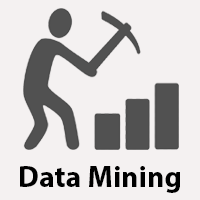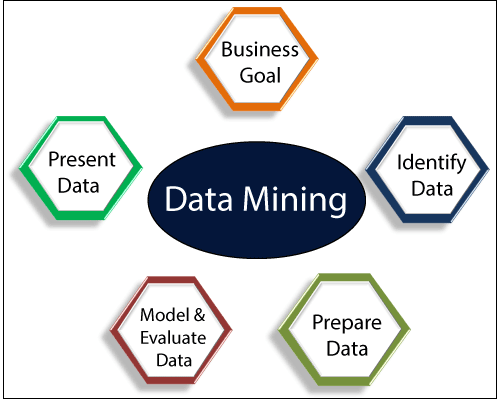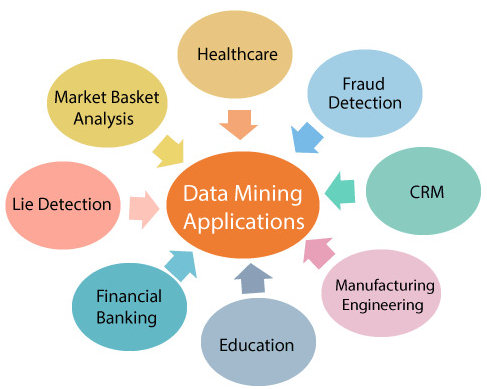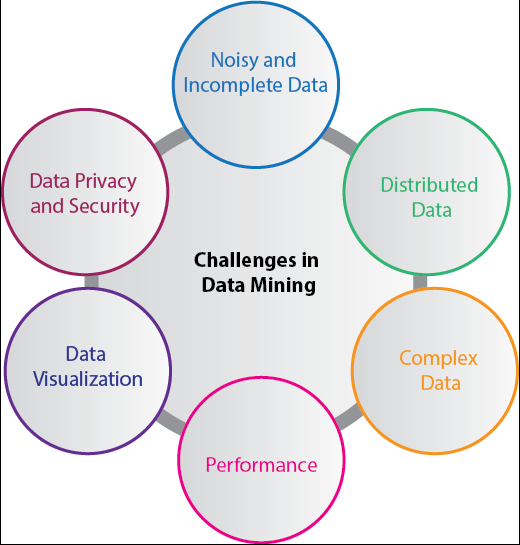Data Mining Tutorial
The data mining tutorial provides basic and advanced concepts of data mining. Our data mining tutorial is designed for learners and experts. Data mining is one of the most useful techniques that help entrepreneurs, researchers, and individuals to extract valuable information from huge sets of data. Data mining is also called Knowledge Discovery in Database (KDD). The knowledge discovery process includes Data cleaning, Data integration, Data selection, Data transformation, Data mining, Pattern evaluation, and Knowledge presentation. Our Data mining tutorial includes all topics of Data mining such as applications, Data mining vs Machine learning, Data mining tools, Social Media Data mining, Data mining techniques, Clustering in data mining, Challenges in Data mining, etc. What is Data Mining?The process of extracting information to identify patterns, trends, and useful data that would allow the business to take the data-driven decision from huge sets of data is called Data Mining. In other words, we can say that Data Mining is the process of investigating hidden patterns of information to various perspectives for categorization into useful data, which is collected and assembled in particular areas such as data warehouses, efficient analysis, data mining algorithm, helping decision making and other data requirement to eventually cost-cutting and generating revenue. Data mining is the act of automatically searching for large stores of information to find trends and patterns that go beyond simple analysis procedures. Data mining utilizes complex mathematical algorithms for data segments and evaluates the probability of future events. Data Mining is also called Knowledge Discovery of Data (KDD). Data Mining is a process used by organizations to extract specific data from huge databases to solve business problems. It primarily turns raw data into useful information. Data Mining is similar to Data Science carried out by a person, in a specific situation, on a particular data set, with an objective. This process includes various types of services such as text mining, web mining, audio and video mining, pictorial data mining, and social media mining. It is done through software that is simple or highly specific. By outsourcing data mining, all the work can be done faster with low operation costs. Specialized firms can also use new technologies to collect data that is impossible to locate manually. There are tonnes of information available on various platforms, but very little knowledge is accessible. The biggest challenge is to analyze the data to extract important information that can be used to solve a problem or for company development. There are many powerful instruments and techniques available to mine data and find better insight from it. 
Types of Data MiningData mining can be performed on the following types of data: Relational Database: A relational database is a collection of multiple data sets formally organized by tables, records, and columns from which data can be accessed in various ways without having to recognize the database tables. Tables convey and share information, which facilitates data searchability, reporting, and organization. Data warehouses: A Data Warehouse is the technology that collects the data from various sources within the organization to provide meaningful business insights. The huge amount of data comes from multiple places such as Marketing and Finance. The extracted data is utilized for analytical purposes and helps in decision- making for a business organization. The data warehouse is designed for the analysis of data rather than transaction processing. Data Repositories: The Data Repository generally refers to a destination for data storage. However, many IT professionals utilize the term more clearly to refer to a specific kind of setup within an IT structure. For example, a group of databases, where an organization has kept various kinds of information. Object-Relational Database: A combination of an object-oriented database model and relational database model is called an object-relational model. It supports Classes, Objects, Inheritance, etc. One of the primary objectives of the Object-relational data model is to close the gap between the Relational database and the object-oriented model practices frequently utilized in many programming languages, for example, C++, Java, C#, and so on. Transactional Database: A transactional database refers to a database management system (DBMS) that has the potential to undo a database transaction if it is not performed appropriately. Even though this was a unique capability a very long while back, today, most of the relational database systems support transactional database activities. Advantages of Data Mining
Disadvantages of Data Mining
Data Mining ApplicationsData Mining is primarily used by organizations with intense consumer demands- Retail, Communication, Financial, marketing company, determine price, consumer preferences, product positioning, and impact on sales, customer satisfaction, and corporate profits. Data mining enables a retailer to use point-of-sale records of customer purchases to develop products and promotions that help the organization to attract the customer. 
These are the following areas where data mining is widely used: Data Mining in Healthcare: Data mining in healthcare has excellent potential to improve the health system. It uses data and analytics for better insights and to identify best practices that will enhance health care services and reduce costs. Analysts use data mining approaches such as Machine learning, Multi-dimensional database, Data visualization, Soft computing, and statistics. Data Mining can be used to forecast patients in each category. The procedures ensure that the patients get intensive care at the right place and at the right time. Data mining also enables healthcare insurers to recognize fraud and abuse. Data Mining in Market Basket Analysis: Market basket analysis is a modeling method based on a hypothesis. If you buy a specific group of products, then you are more likely to buy another group of products. This technique may enable the retailer to understand the purchase behavior of a buyer. This data may assist the retailer in understanding the requirements of the buyer and altering the store's layout accordingly. Using a different analytical comparison of results between various stores, between customers in different demographic groups can be done. Data mining in Education: Education data mining is a newly emerging field, concerned with developing techniques that explore knowledge from the data generated from educational Environments. EDM objectives are recognized as affirming student's future learning behavior, studying the impact of educational support, and promoting learning science. An organization can use data mining to make precise decisions and also to predict the results of the student. With the results, the institution can concentrate on what to teach and how to teach. Data Mining in Manufacturing Engineering: Knowledge is the best asset possessed by a manufacturing company. Data mining tools can be beneficial to find patterns in a complex manufacturing process. Data mining can be used in system-level designing to obtain the relationships between product architecture, product portfolio, and data needs of the customers. It can also be used to forecast the product development period, cost, and expectations among the other tasks. Data Mining in CRM (Customer Relationship Management): Customer Relationship Management (CRM) is all about obtaining and holding Customers, also enhancing customer loyalty and implementing customer-oriented strategies. To get a decent relationship with the customer, a business organization needs to collect data and analyze the data. With data mining technologies, the collected data can be used for analytics. Data Mining in Fraud detection: Billions of dollars are lost to the action of frauds. Traditional methods of fraud detection are a little bit time consuming and sophisticated. Data mining provides meaningful patterns and turning data into information. An ideal fraud detection system should protect the data of all the users. Supervised methods consist of a collection of sample records, and these records are classified as fraudulent or non-fraudulent. A model is constructed using this data, and the technique is made to identify whether the document is fraudulent or not. Data Mining in Lie Detection: Apprehending a criminal is not a big deal, but bringing out the truth from him is a very challenging task. Law enforcement may use data mining techniques to investigate offenses, monitor suspected terrorist communications, etc. This technique includes text mining also, and it seeks meaningful patterns in data, which is usually unstructured text. The information collected from the previous investigations is compared, and a model for lie detection is constructed. Data Mining Financial Banking: The Digitalization of the banking system is supposed to generate an enormous amount of data with every new transaction. The data mining technique can help bankers by solving business-related problems in banking and finance by identifying trends, casualties, and correlations in business information and market costs that are not instantly evident to managers or executives because the data volume is too large or are produced too rapidly on the screen by experts. The manager may find these data for better targeting, acquiring, retaining, segmenting, and maintain a profitable customer. Challenges of Implementation in Data miningAlthough data mining is very powerful, it faces many challenges during its execution. Various challenges could be related to performance, data, methods, and techniques, etc. The process of data mining becomes effective when the challenges or problems are correctly recognized and adequately resolved. 
Incomplete and noisy data: The process of extracting useful data from large volumes of data is data mining. The data in the real-world is heterogeneous, incomplete, and noisy. Data in huge quantities will usually be inaccurate or unreliable. These problems may occur due to data measuring instrument or because of human errors. Suppose a retail chain collects phone numbers of customers who spend more than $ 500, and the accounting employees put the information into their system. The person may make a digit mistake when entering the phone number, which results in incorrect data. Even some customers may not be willing to disclose their phone numbers, which results in incomplete data. The data could get changed due to human or system error. All these consequences (noisy and incomplete data)makes data mining challenging. Data Distribution: Real-worlds data is usually stored on various platforms in a distributed computing environment. It might be in a database, individual systems, or even on the internet. Practically, It is a quite tough task to make all the data to a centralized data repository mainly due to organizational and technical concerns. For example, various regional offices may have their servers to store their data. It is not feasible to store, all the data from all the offices on a central server. Therefore, data mining requires the development of tools and algorithms that allow the mining of distributed data. Complex Data: Real-world data is heterogeneous, and it could be multimedia data, including audio and video, images, complex data, spatial data, time series, and so on. Managing these various types of data and extracting useful information is a tough task. Most of the time, new technologies, new tools, and methodologies would have to be refined to obtain specific information. Performance: The data mining system's performance relies primarily on the efficiency of algorithms and techniques used. If the designed algorithm and techniques are not up to the mark, then the efficiency of the data mining process will be affected adversely. Data Privacy and Security: Data mining usually leads to serious issues in terms of data security, governance, and privacy. For example, if a retailer analyzes the details of the purchased items, then it reveals data about buying habits and preferences of the customers without their permission. Data Visualization: In data mining, data visualization is a very important process because it is the primary method that shows the output to the user in a presentable way. The extracted data should convey the exact meaning of what it intends to express. But many times, representing the information to the end-user in a precise and easy way is difficult. The input data and the output information being complicated, very efficient, and successful data visualization processes need to be implemented to make it successful. There are many more challenges in data mining in addition to the problems above-mentioned. More problems are disclosed as the actual data mining process begins, and the success of data mining relies on getting rid of all these difficulties. PrerequisitesBefore learning the concepts of Data Mining, you should have a basic understanding of Statistics, Database Knowledge, and Basic programming language. AudienceOur Data Mining Tutorial is prepared for all beginners or computer science graduates to help them learn the basics to advanced techniques related to data mining. ProblemsWe assure you that you will not find any difficulty while learning our Data Mining tutorial. But if there is any mistake in this tutorial, kindly post the problem or error in the contact form so that we can improve it.
Next TopicData Mining Techniques
|
 For Videos Join Our Youtube Channel: Join Now
For Videos Join Our Youtube Channel: Join Now
Feedback
- Send your Feedback to [email protected]
Help Others, Please Share










